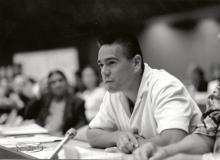Please visit this site to read the entire piece title- Idle No More & Indigenous Nationhood. I found this writing to be so enlightening! Taiaiake Alfred is a phenomenal Mohawk author whose expertise in Native American studies is very relevant to histories of all Indigenous peoples. I feel that his writing here is relatable to the Idle No More movement because of his experiences and activism and research with First Nations people. In expressing the importance of Idle No More, here is an excerpt from the link written by Taiaiake:
"But it is clear too that the movement has plateaued. Much of the passion, urgency and attention Idle No More generated is dissipating in the wake of Chief Theresa Spence’s fast and the “13 Point Declaration” supported by Chief Spence, the Assembly of First Nations and the two Canadian opposition parties - which to many people in the movement represents a cooptation of the movement’s demands by the chiefs of the Assembly of First Nations in support of their ongoing negotiations and long-running bureaucratic processes. The question in the minds of many people in the movement who are committed to more serious and transformational goals is how do we revive the momentum driving us towards fundamental change that we had at the start of the movement? I think that the only way to keep this movement going is for us to see our actions in Idle No More as part of a larger and long-standing commitment to the restoration of Indigenous nationhood."
Taiaiake goes on to question the relevance of Idle No More and what it has accomplished. He challenges to achieve change for Natives, using social media to be more than just another "rant," and the effectiveness of this movement. Natives need to use this movement to gain mobilization of people "on the basis of Indigenous Nationhood."
Misha Averill is a senior at the University of Washington, majoring in American Indian Studies with a minor in Diversity. Her future aspirations include helping Native American communities through preservation of traditions, culture, language, and human rights. Misha has a special interest in Indigenous Rights and cross-culture interactions, and she hopes to attend law school for tribal government and Indian law.
